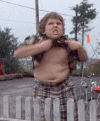One-eyed Willy’s rich stuff: brands as movie heroes
 I have just spent an entire day on a plane. I can’t sleep on flights, even after heavy sedation. So I watched seven films, back to back. Most of the new ones were truly awful and I couldn’t finish them. So I watched an old favourite, The Goonies. I have probably watched this film more than 200 times since I was a kid. But this time, with work in the back of my mind, one thing stuck out – how much brands were the stars of the film.
I have just spent an entire day on a plane. I can’t sleep on flights, even after heavy sedation. So I watched seven films, back to back. Most of the new ones were truly awful and I couldn’t finish them. So I watched an old favourite, The Goonies. I have probably watched this film more than 200 times since I was a kid. But this time, with work in the back of my mind, one thing stuck out – how much brands were the stars of the film.
 There’s geeky fun to be had spotting brands in movies and the role they play. In The Goonies, the bond between Chunk and Sloth is formed while they share a bar of Baby Ruth. This scene manages to give the brand a sort of reverential glow – even though Chunk, the caricature of a fat American kid, had amused and repulsed the viewer with the ‘truffle shuffle’ just a few scenes earlier. I’m not sure that, if the film was made now, the marketers at Baby Ruth would be quite so comfortable with the associations with chubby children.
There’s geeky fun to be had spotting brands in movies and the role they play. In The Goonies, the bond between Chunk and Sloth is formed while they share a bar of Baby Ruth. This scene manages to give the brand a sort of reverential glow – even though Chunk, the caricature of a fat American kid, had amused and repulsed the viewer with the ‘truffle shuffle’ just a few scenes earlier. I’m not sure that, if the film was made now, the marketers at Baby Ruth would be quite so comfortable with the associations with chubby children.
Domino’s Pizza and Pepsi are also featured in The Goonies. But they are not central to the story – they are extras, not heroes. By contrast the Jeep Cherokee in the opening scene not only helps the Fratellis make their getaway, it also enters an SUV race by accident, leaving the rest for dead. Click on this picture to watch the scene.


Starbucks in ‘You’ve Got Mail’
Bollinger have featured in the Bond films, at no cost, bar a few cases of SC and RD to the production office.
In the books, Bond drinks Dom Perignon, but Cubby Broccoli preferred Bollinger, so a personal contra was arranged.
Bond also drove a Rolls in the books, but has variously notably driven Aston Martins, Lotus, BMW and few other cameo cars – including a 2CV…
Films not suitable for viewing on flight over Pacific
http://www.imdb.com/video/imdb/vi1874919705/
Glock and Beretta in all action movies. The M4 in Call of Duty. BMW in Mission Impossible Ghost Protocol.
If we the cigarettes in certain films are paid promotions then wouldn’t that mean that the film can’t be shown on Australian TV without violating the law?
For example – a shot of Beyonce holding a cigarette holder was deemed to be a violation of the TAP act in 2007 – so *if* the cigarette was organised then product placement then why would it be legal to show ‘True Romance’ in the cinemas or on TV ?
The law that would seem to a apply is the TAP Act 1992 – It is easily findable on http://www.comlaw.gov.au . Anyone with real legal experience in the matter care to comment?
“A movie is not what it is about, it’s how it is about it.”
great article….how good was the Goonies!!!!
It could be worth mentioning what Easy Rider did for Harley sales
the delorean in back to the future is the all time greatest placement of a car, pity the company went broke prior to the films release or it may have doubled the amount of sales from 5 to 10 cars per year…
Even when a movie is not Busting a Block, it is re-iterating and re-iterating and re-iterating. Sometimes it is just a matter of jogging memory buds out of lethargy. Harris Tweed . . love it. Apres-Downton Abbey. . . Toute de la Monde REALLY loves it .
Many notable fashion flash-trends have been sparked by movies. I used to do a ‘fun’ lecture called The Visual Vocabulary of the Vest on just that subject. . . . Eheu! Snore
Goonies. Win.